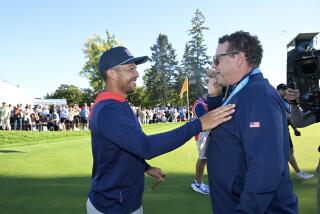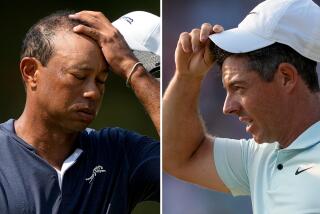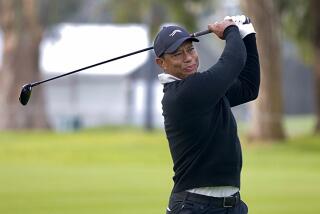Woods Blames Slow Starts for Bad Finish
- Share via
The Ryder Cup hangover was pretty bad for the United States team Monday, and not just because the players were drinking and dancing into the wee hours with the European team Sunday.
The bigger headaches come from the results: Three consecutive Ryder Cup losses, including two by identical 18 1/2 -9 1/2 scores, a record margin of victory. And now comes the biggest task of all, trying to figure out what keeps going wrong and how to fix it.
“Everyone wants answers out there. What happened? Why?” said U.S. player Jim Furyk.
But there is no quick fix, according to Tiger Woods, who spoke with reporters via conference call Monday. He said it is all a matter of making putts at the right times to seize momentum, something the European team has done the last two Ryder Cups, including the recently concluded one held at the K Club in Straffan, Ireland.
“Time and time again, if you watch the highlights, you see where our ball is in position to make momentum-changing putts, and it didn’t happen,” Woods said. “I think we basically hit it about the same, but they just holed so many more putts than we did. And on top of that, they holed the critical putts that would turn momentum and we did not.”
Theories abound that the U.S. team doesn’t want it bad enough or that it is just a compilation of spoiled millionaires who can’t play well together. Other say the Europeans get along better and therefore shine in team situations.
Woods said the shape of each player’s game on the first tee the first day is far more important than other theories as to why the U.S. has lost recent Ryder Cups.
“I have always felt that it’s always important to get off to, you know, quick starts in your matches,” he said. “If you look at the matches this year and you look at the matches at Oakland Hills [in Michigan] two years ago, we were down in either one or two holes within the first five, six, seven holes.”
A fast start becomes magnified in match play, Woods said, especially when you are playing 18-hole matches.
“You could be three down after the first nine holes in a stroke-play event, but knowing the fact that you’ve got 63 holes to go, it doesn’t really bother you that much,” Woods said. “But in match play, it can turn pretty quickly.”
Home-course advantage also favors European players, Woods said, because the Ryder Cups there are played on courses where the European Tour regularly plays events. Ryder Cups in the U.S. have trended toward courses that PGA Tour players rarely get to play.
“We have chosen venues that are fantastic venues, difficult golf courses, but courses we don’t play,” Woods said. “So it’s pretty much neutral. We’re both going in there not that experienced on the site.”
That will be the case for the 2008 Ryder Cup, which will be played at Valhalla Golf Club in Kentucky. The last time PGA pros saw that course was at the 2000 PGA Championship.
The search for excuses and reasons will go on. Captain Tom Lehman will be criticized along with the U.S. players, but, Woods said, it might be time for Americans to accept that the Europeans might just have a better, deeper lineup.
And with Sergio Garcia, Paul Casey and Luke Donald yet to reach their 30th birthdays, the Europeans have a core of top young players who will be around for Ryder Cups to come.
“They have a younger crop of players that are playing well,” Woods said. “When our youngest player is 30 years old, that’s not a positive thing.”
This loss stung as bad as any other, Woods said, but the feeling of bitterness toward the European team wasn’t there as it had been in the past. Call it a newfound respect for the opposition or a humility that the Americans had lacked in the past, but this team was gracious in defeat.
Instead of hopping on private jets and wallowing over the Atlantic, the American team stayed and helped their counterparts celebrate, singing and dancing late into the night, Woods said.
“This was the first time I’ve ever experienced anything like this in the Ryder Cup before where both teams, the majority of the guys, the majority of the Europeans, were hanging with us and tipping back a few and listening to music and just having a great time,” Woods said.
“I think it was a true celebration of golf. I think that’s the spirit of how this competition was supposed to be.”
*
The 16-player field for the Target World Challenge on Dec. 13-17 at Sherwood Country Club will include 11 players from the U.S. and European Ryder Cups teams that competed last weekend in Ireland, tournament host Woods announced.
Woods and defending champion Donald lead that group, which also includes Colin Montgomerie, Darren Clarke, Padraig Harrington, Casey, Jose Maria Olazabal, Henrik Stenson, David Howell, David Toms and Chris DiMarco.
Australians Adam Scott and Geoff Oglivy, the U.S. Open champion, also are playing, while Americans Fred Couples, Davis Love III and John Daly round out the field.
The purse for the unofficial tournament is $5.75 million, with the winner taking home $1.35 million and the last-place finisher netting $170,000. Proceeds from the tournament benefit the Tiger Woods Foundation.
More to Read
Go beyond the scoreboard
Get the latest on L.A.'s teams in the daily Sports Report newsletter.
You may occasionally receive promotional content from the Los Angeles Times.









